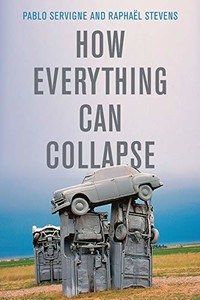Sophie Pinkham in Bookforum:
 “UTOPIA HAS SUDDENLY changed camp,” write Pablo Servigne and Raphaël Stevens in How Everything Can Collapse: A Manual for Our Times, just out in an English translation by Andrew Brown. “Today, the utopian is whoever believes that everything can just keep going as before.” In 2015, when the book was first published in France, such a statement might have sounded alarmist. In 2020, Collapse feels positively prophetic. Things have not kept going as before, and it seems increasingly doubtful that they ever will again.
“UTOPIA HAS SUDDENLY changed camp,” write Pablo Servigne and Raphaël Stevens in How Everything Can Collapse: A Manual for Our Times, just out in an English translation by Andrew Brown. “Today, the utopian is whoever believes that everything can just keep going as before.” In 2015, when the book was first published in France, such a statement might have sounded alarmist. In 2020, Collapse feels positively prophetic. Things have not kept going as before, and it seems increasingly doubtful that they ever will again.
That doesn’t mean that these are end times. Servigne and Stevens argue that the specter of apocalypse, like the economic gospel of perpetual growth, is only a distraction from the true danger: civilizational collapse resulting from wanton exploitation of natural resources. At the end of the world we can relax, because there will be nothing left to do. Collapse, by contrast, requires hard work, because it is as much a beginning as an end. In the view of these self-styled “collapsologists,” the disintegration of national and global institutions will demand invention, resourcefulness, and a return to small, mostly self-sufficient communities that depend on local networks of mutual aid. The newly minted discipline of collapsology aims to help people prepare for this new way of being.
How Everything Can Collapse was a best seller in France, but collapsology is controversial. Some environmentalists have attacked it as counterproductive “catastrophism” that will inspire despair rather than action. For others collapsology is a disturbing survivalist fantasy. But every day it gets harder to ignore the disasters that loom before us—or that have already arrived. Most recently, the debacle of the US response to COVID-19 is a reminder of our chronic failure to prepare, no matter how obvious the threat.
More here.
